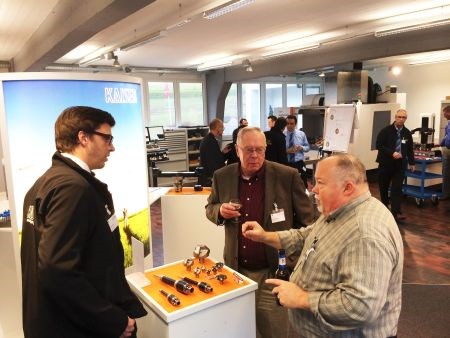U.S. Manufacturers Tour Kaiser Switzerland
A group of U.S. manufacturers recently visited the Kaiser headquarters in Zurich, Switzerland, touring the assembly and machining areas and attending educational presentations.

David Stucki, Marketing Manager at Kaiser Switzerland, discusses new Kaiser products with United States guests at the recent open house.
BIG Kaiser hosted a group of U.S. manufacturers on a visit to the Kaiser headquarters in Zurich, Switzerland in February. The third annual event featured educational presentations, tours of the assembly and machining areas, and traditional Swiss hospitality.
“The challenges of manufacturing are universal,” Dennis Rosene, owner of Rosene Machine, Firth, Neb., said. “Visiting factories outside the U.S. can help us find new ways to solve the challenges we face at home.”
The visitors were given a brief overview of the global organization. Many were surprised to learn that 25 percent of the BIG Kaiser products they use are actually licensed for manufacturing in Tennessee.
“Many of our tools are designed to the CAT specification common only in the U.S. With a portfolio of over 30,000 items, it’s important we have domestic production and inventory for our customers,” Jack Burley, VP, BIG Kaiser explained. Meanwhile, products such as digital boring heads, micro tools, tool presetters and HSK shanks are produced at the facilities in Europe. In 2003, Kaiser entered into a global sales and marketing partnership with BIG Daishowa of Japan, thus changing the name of the U.S. operations to BIG Kaiser, and expanding the product line globally.
One highlight of the tour was the selection of new boring head technology. Released in 2012, this line of high-precision digital boring heads is designed and manufactured at the Swiss facility. A small sensor and digital display are built into each tool body, allowing quick and precise adjustment of the tool carrier. The patented design saves time and enables critical boring adjustments down to 0.00005”.
Machining tests demonstrated the benefits of proper tool selection and tool balancing. Cycle time, chip management and part finish can all be notably improved even on machines that are not particularly robust.
High interest in Kaiser’s apprenticeship program reflected the common challenge of finding skilled machinists. Each year, a few select students are accepted into Kaiser’s four-year program. The apprenticeship combines continuing education in the classroom with training on various CNC machine platforms and controls. Over four years, students master fundamental skills and move on to real-world challenges such as fixture design or process improvement. Approximately 90 percent of the machinists at Kaiser graduated from an apprenticeship, and many continued studies to become master craftsmen.















.jpg;maxWidth=300;quality=90)
